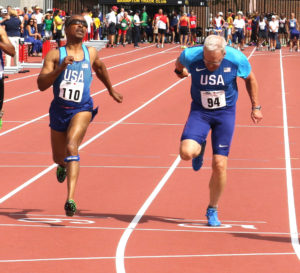Today we share an amazing story from good friend Dr. Robert (Bob) Bowen who shares a passion for health, fitness, longevity, and living the vigorous life.
Robert has strung together one of the most amazing streaks I have heard of which is running your age in seconds in the 400 which started at age 52. Bob is now 68 and ran 62 seconds this year!
He is still practicing medicine full time and competing in National and International level track.
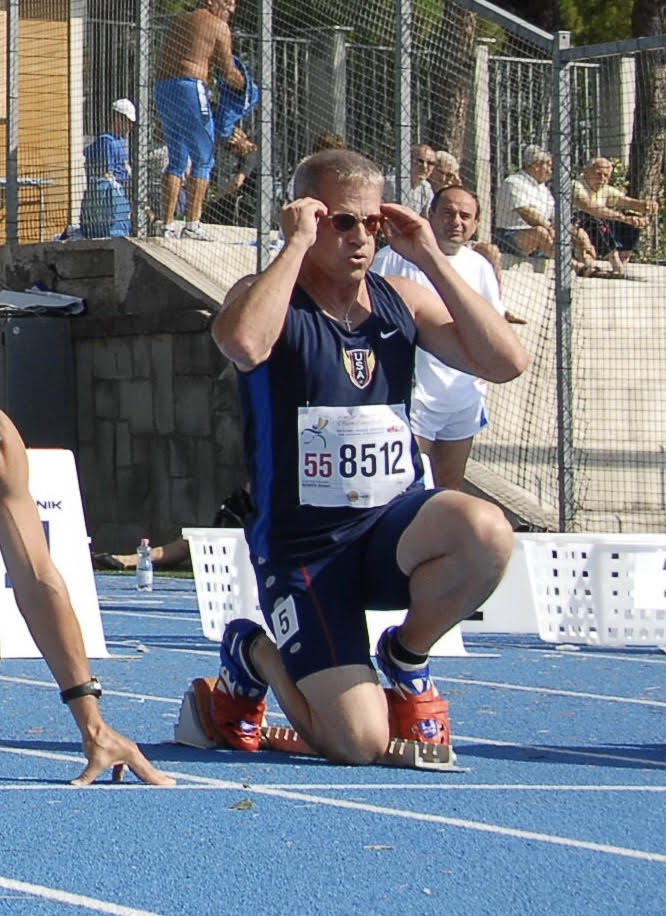
…………………….
Tell us about your background in athletics? Did you play lots of sports as a child?
As a child I suffered from asthma and as a result got winded very easily when playing outside. But to my benefit my doctor and my parents felt that was not a reason to stay inside. So I was encouraged to continue to play sports. My family are all athletes so we always just had a lot of fun playing outside whether it was in a sport, just a game, climbing trees, or running through a field. In high school I played football and ran track interscholastically and played most other sports in the backyard.
When I was a high school athlete what my coaching consisted of was the coach sitting in the teachers lounge and smoking cigarettes and telling us that we had to run down to the river and back so what we actually did was lay in the polevault pit until it was time to go up and we wondered how come we never got any faster.
How has physical activity changed from when you were growing up to how it is today for children?
Today it seems like most activities that kids have are organized sports where the teams have uniforms and there are coaches. For us it was an empty lot and no adults and we taught ourselves.
Tell us a bit about your education background and your interest in medicine?
After high school I attended University of Illinois for undergraduate school where I majored in bio chemistry and immunochemistry. I was very interested in immunology research. My interest in medicine stemmed from the time as a young child when I was sick with asthma and had a doctor who took care of me and made me feel better. I felt that’s what I wanted to do when I got older. Make people feel better.
Specifically he advocated for me to play sports and never let my condition dictate what my level of activity would be. During football games he was on the sideline and would administer medicine to me so that I could breathe well enough to continue to play. In those days I was typical for a doctor to advise if you got short of breath while exercising just to stop exercising. Dr. Fuller did not believe in that philosophy. He had two sons older than me both of whom were all-state in basketball and football and had asthma and had played at very high levels. So he had evolved a technique of treating asthmatic athletes that I was able to take advantage of.
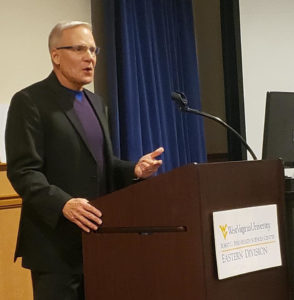
When we originally met 15 years ago it was mostly around pulmonary and critical care medicine and then you started developing an interest in healthy aging. How did all this evolve?
I started in critical care medicine after my internal medicine residency. There was no fellowship training in critical care medicine at the time so I did an anesthesia residency skewed heavily toward taken care of critically ill postoperative patients. After I finished that fellowship I also did a fellowship in pulmonary medicine and was sent by the university to France to train in laser bronchoscopy. Around the turn of the last century the laser technology for aesthetics purposes became much more practical and I love using my knowledge of light and tissue interaction that I learned from treating tumors of the lung to treating cutaneous difficulties as well.
When did you find you had a talent for sprinting?
I was always one of the faster or fastest kids in the class as my brother was in his class. Our father had been a professional athlete and was currently a college president who worked out with the college basketball team on a daily basis so that it never occurred to my brother and I that we would have to give up sports when we finish school. We would continue to play ball right through retirement as our dad had done. When I found out that I was really fast was in college and I ran an intramural track meet and won the 60 yard dash indoors in a time of 6.0 seconds which was very close to the world record at that time. I thought “well maybe I’m better at this than I thought”, but I had no avenue to pursue that at that time beyond intramural sports. In college my studies occupied my time so I started running seriously during my residency and fellowship training
You currently have a streak going which is one of the most phenomenal I have ever heard about, running your age in seconds in the 400, can you tell us a bit about that ?
For readers that are not familiar with this there are a few milestones which are connected with growing older. One is shooting your score in golf. To shoot less than your age for 18 holes is considered a great achievement. Running under five minutes for the mile over a period of years and running under three hours for the marathon as one ages are also similar milestones. (my story on Sub 3 in marathon for 30 yrs)
The first time I ran my age for the 400 in seconds was when I was 52 and I have been able to do that every subsequent year including this year when I am 68. I ran my best time this year in the 400 at 62 seconds and there is no doubt about it – it gets easier as you get older.
Tell us about your training now? How is this different from when you were younger? What are the key training principles you have learned along the way that you wish you had known earlier in your career?
My training is much more modest now than earlier in my career. Back then I focused on running larger volumes, weight training, and explosive plyometrics. Now that my tendons and ligaments aren’t as supple as they once were the same volume and intensity results in more injuries which limits the chance to participate. It’s a lot more fun to be able to run the race then to watch other athletes from the stands. So at this point I will typically lift twice a week and run twice a week. I might spend an extra session during track season doing specific techniques like relay exchange, handoffs, and starting blocks.
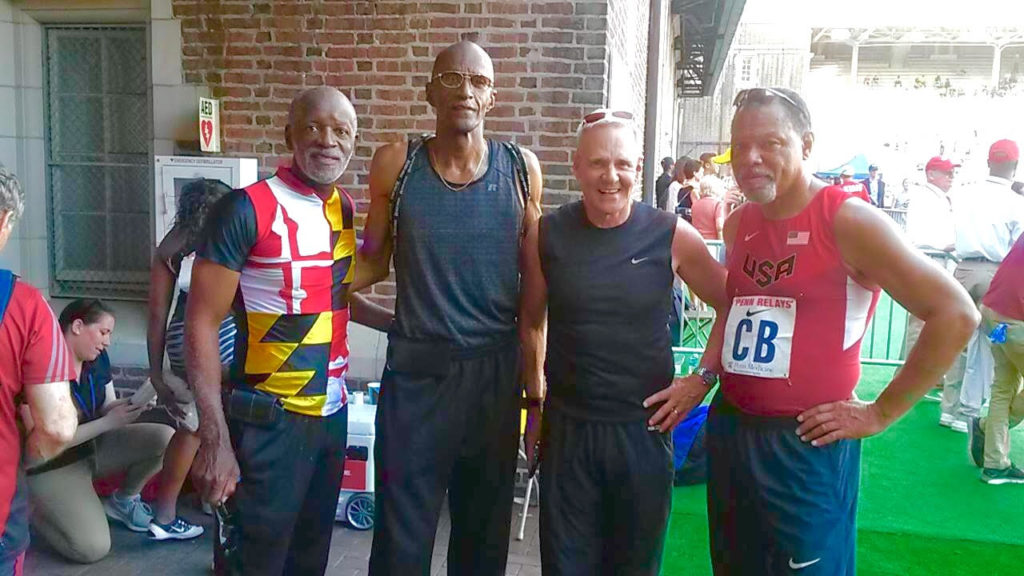
You are a coach now and what are some of the key principles you teach your athletes?
( on a light heart id note I ran into 1 of your athlete’s over 10 years ago in our clinic parking lot. For clinic morale myself and Dr. Travis Schildt ran a challenge race fully costumed around our clinic it was about 400 m. the first year I crushed him. and then he found you and went into Rocky style training and the following year he completely dusted me! )
One of the most important things that I want my athletes to know is that we are doing this for fun. Very few of us are ever going to make any money doing this so if it’s not fun and we’re not enjoying the process it’s probably not worth doing. The other thing that I think is important for my athletes to know is that the most important opponent that we compete against is ourselves. From last week, last year, or last decade, competing against others is not necessary although it’s a lot of fun. It’s not necessary because there will always be people who go faster and slower than us and a particular place in a race how you compare to somebody else today does not relate to how well you’re performing to your potential. It is possible to be a winner in a race even though we don’t come in first. Much was taught to me by my coach John Smith who has also coached Maurice Green, Ato Bolton , Kevin Young and many other world champion and Olympic medalists.
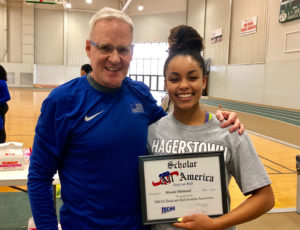
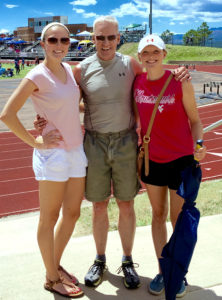
We both have a keen interest in the importance of nutrition. what principles to you encourage for health and athletics?
On nutrition I feel that the primary rule is to be eating a balanced diet with predominantly food without preservatives. In other words foods that are on the perimeter of the grocery store where refrigeration is required. That would include fresh vegetables, fruits, meat and dairy, and minimize manufactured foods and minimize carbohydrate intake.
As we age recovery is even more critical. What have you learned about recovery and what is different between a 70-year-old, a 40-year-old, and a 20-year-old?
Training for each of those age groups will be different. For a 20-year-old training focuses on acquiring a skill and repeating the movement. As you approach 40 those pathways from the brain to the muscle are well established and less time needs to be spent on that and more time on high-quality training and adequate recovery. So no hard work out two days in a row. So typically I would do two days of weekly training. One of those days would be a long endurance which for me means a workout like a 400, followed by a 300, followed by a 200. Then shorter endurance which would be 6×150 m with four minutes recovery at 90 to 95%
If you can, share your key principles of healthy aging -without giving away any secrets to your competition 🙂
Avoiding toxins such as cigarettes and environmental exposures, using a sunblock and a hat to protect your skin, eating a healthy diet, and moderate training.
How has the pandemic affected your training and coaching?
It’s affecting my coaching that we have had no outdoor track in the spring of 2020 and will have no indoor track in the winter of 2020- 2021, hoping of course that we can still complete outdoors this spring and summer. How it’s affecting my training is that I’m probably train less and surprisingly as a result have been actually running faster times than I have in five or six years because I am remaining healthy. So as we get older with training less is often more
Any athletic goals for the future?
My goals in sports are to run to the best of my potential as I continue to age and to compete successfully on National as well as world stage where I have had such a great opportunity to meet so many nice and interesting people and to travel to places I never would’ve seen otherwise
Public health in America. Are we on the right course or heading for complete catastrophe?
Actually it might be some of both. I think the general public health is something being done very well in America. But the recent idea that public health is a matter for politicians and the political ramifications that go with public health are destructive as diseases and conditions do not respect someone’s political agendas
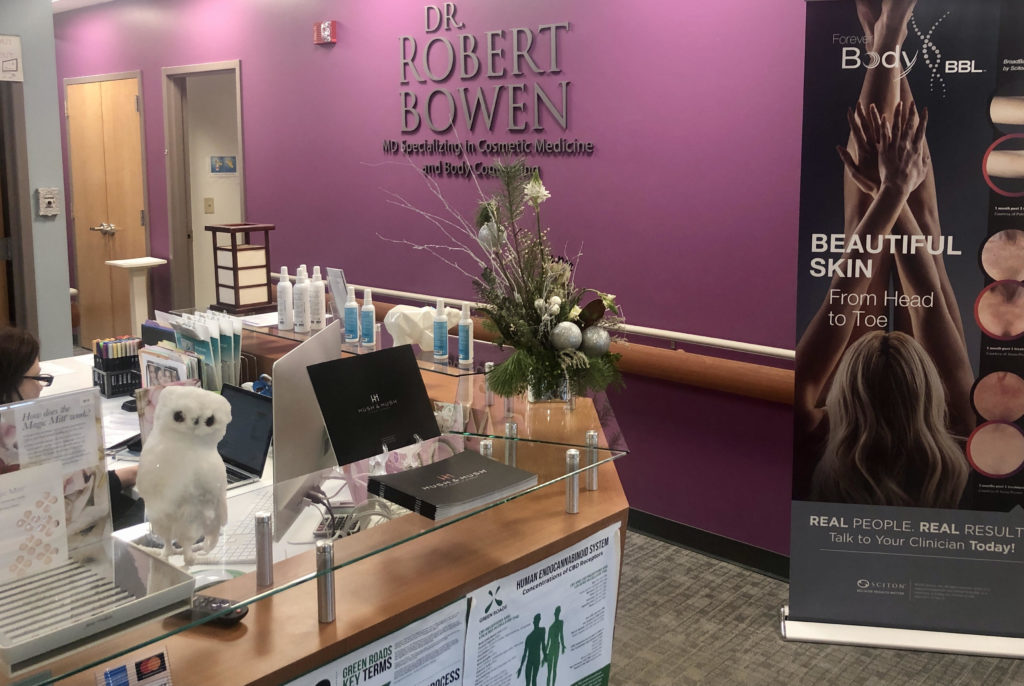
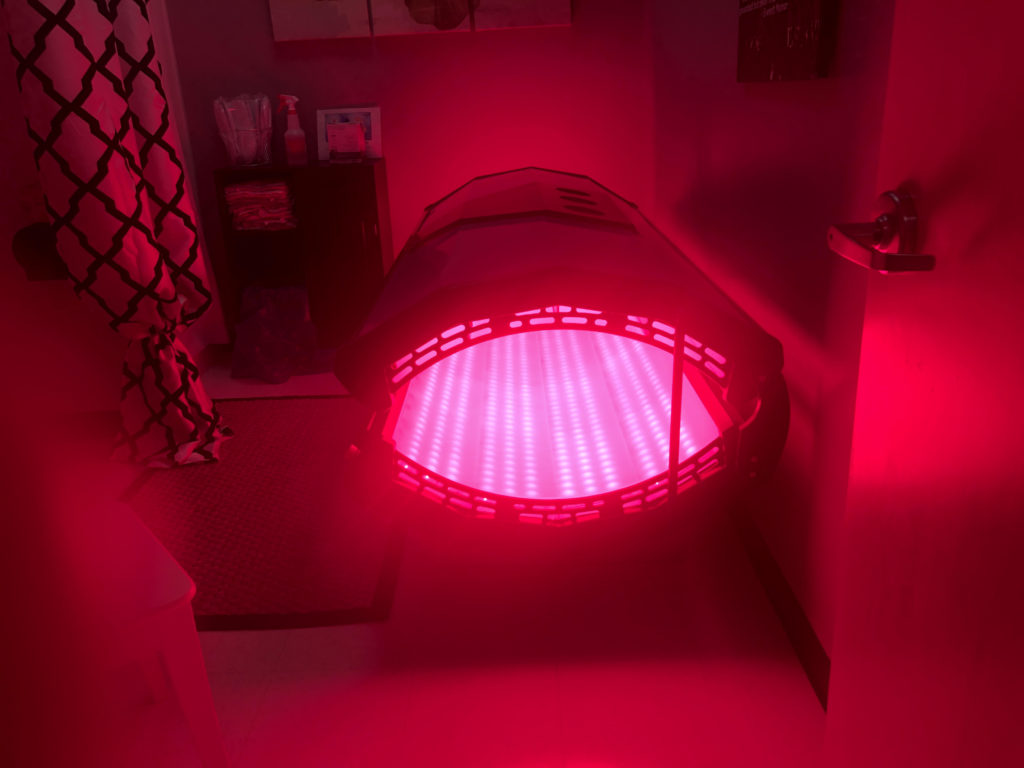
Dr Robert Bowen practice site
https://www.drrobertbowen.com/robert-bowen/


